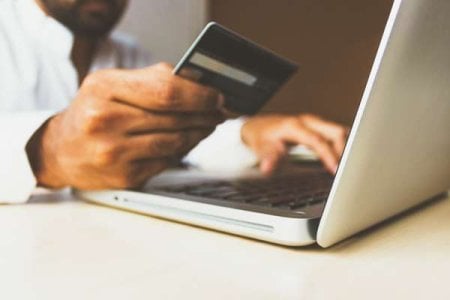Could Buy Now Pay Later repayments be forcing countless Australians to miss meals?
In today's fast-paced world, where convenience rules, the shopping landscape has evolved, transitioning from traditional lay-by to the increasingly popular 'Buy Now, Pay Later' (BNPL) trend.
Let's explore the impact and implications of this modern shopping phenomenon, because it hasn’t all been positive.
In the world of online shopping, the ease of click-and-purchase can sometimes lead to unintended consequences.
It has come to light that many Australians are prioritising their Buy Now, Pay Later (BNPL) repayments over their basic needs, such as regular nutritious meals.

Finder spokesperson Taylor Blackburn paints a concerning picture: 'With mounting cost of living pressures, people are turning to this easy credit to make ends meet. They’re setting themselves up for disaster with other things like increased energy prices and the rising cost of food.'
In fact, Finder reported that nearly half of Australians had used a BNPL service this year. Around a third of Aussie consumers are using BNPL for regular expenses such as household bills, groceries, and fuel.
That’s not all. About 2.8 million Australians are favouring BNPL repayments over other bills.
The ‘interest-free’ loans offered by Buy Now, Pay Later (BNPL) services can be enticing, but it's important to examine the full picture.
Recent findings by Finder have revealed that a significant number of Australians, approximately one in ten, have faced late fees associated with BNPL services. Surprisingly, these late fees can sometimes be even higher than the interest rates charged by credit cards.
The alarm bells are ringing, with reports that 14 per cent of Australians have skipped an energy bill payment, 11 per cent have missed meals, and 9 per cent have dodged a mortgage repayment, all for the sake of settling their BNPL commitments.

Even the Salvation Army’s Moneycare Counselling Service confirms this distressing evidence. National Manager Kristen Hartnett reports cases of people taking out short-term loans, skipping meals, and even vital services like home and car insurance to keep up with BNPL repayments.
It is true that most Buy Now, Pay Later (BNPL) operators have restrictions in place to prevent the use of their services for purchasing items such as gift cards.
However, there have been instances where loopholes exist, such as Afterpay offering gift cards for major supermarkets like Coles and Woolworths. These practices have raised concerns regarding the potential for customers to spiral into debt.
In response to these concerns, the Australian Securities and Investments Commission (ASIC) introduced regulations to address the risks associated with BNPL services.
As part of these regulations, ASIC issued a stop order on BNPL operator Humm, which offered consumers the ability to borrow up to $2000 for ‘little things’ and $30,000 for ‘big things’.
It’s worthwhile keeping in mind alternatives such as interest-free loan options like those offered by federally funded Good Shepherd, an alternative to payday lending or loan sharks, as Social services minister Amanda Rishworth mentioned to 7NEWS.
‘(They are) a really important alternative to payday lending or loan sharks.’ she shared.

Members, what are your thoughts on the alarming trend of Australians prioritising repayments over their basic needs? Share your perspectives with us in the comments below.
Let's explore the impact and implications of this modern shopping phenomenon, because it hasn’t all been positive.
In the world of online shopping, the ease of click-and-purchase can sometimes lead to unintended consequences.
It has come to light that many Australians are prioritising their Buy Now, Pay Later (BNPL) repayments over their basic needs, such as regular nutritious meals.

Buy Now, Pay Later services have gained immense popularity in the modern shopping landscape, offering convenience and flexibility to consumers. Image by rupixen from unsplash
Finder spokesperson Taylor Blackburn paints a concerning picture: 'With mounting cost of living pressures, people are turning to this easy credit to make ends meet. They’re setting themselves up for disaster with other things like increased energy prices and the rising cost of food.'
In fact, Finder reported that nearly half of Australians had used a BNPL service this year. Around a third of Aussie consumers are using BNPL for regular expenses such as household bills, groceries, and fuel.
That’s not all. About 2.8 million Australians are favouring BNPL repayments over other bills.
The ‘interest-free’ loans offered by Buy Now, Pay Later (BNPL) services can be enticing, but it's important to examine the full picture.
Recent findings by Finder have revealed that a significant number of Australians, approximately one in ten, have faced late fees associated with BNPL services. Surprisingly, these late fees can sometimes be even higher than the interest rates charged by credit cards.
The alarm bells are ringing, with reports that 14 per cent of Australians have skipped an energy bill payment, 11 per cent have missed meals, and 9 per cent have dodged a mortgage repayment, all for the sake of settling their BNPL commitments.

However, the potential risks associated with accumulating debt, late fees, and prioritising repayments over basic needs have raised concerns about the financial well-being of individuals using these services. Image by Karolina Grabowska from pexels
Even the Salvation Army’s Moneycare Counselling Service confirms this distressing evidence. National Manager Kristen Hartnett reports cases of people taking out short-term loans, skipping meals, and even vital services like home and car insurance to keep up with BNPL repayments.
It is true that most Buy Now, Pay Later (BNPL) operators have restrictions in place to prevent the use of their services for purchasing items such as gift cards.
However, there have been instances where loopholes exist, such as Afterpay offering gift cards for major supermarkets like Coles and Woolworths. These practices have raised concerns regarding the potential for customers to spiral into debt.
In response to these concerns, the Australian Securities and Investments Commission (ASIC) introduced regulations to address the risks associated with BNPL services.
As part of these regulations, ASIC issued a stop order on BNPL operator Humm, which offered consumers the ability to borrow up to $2000 for ‘little things’ and $30,000 for ‘big things’.
It’s worthwhile keeping in mind alternatives such as interest-free loan options like those offered by federally funded Good Shepherd, an alternative to payday lending or loan sharks, as Social services minister Amanda Rishworth mentioned to 7NEWS.
‘(They are) a really important alternative to payday lending or loan sharks.’ she shared.
Key Takeaways
- An increasing number of Australians are resorting to Buy Now Pay Later (BNPL) services to cover everyday expenses, leading to substantial debts.
- Many Aussies are making significant sacrifices, including skipping meals, to meet their BNPL repayments.
- Data indicates that one in ten Australians have recently incurred late fees from BNPL services, which can be as costly as credit card interest.
- Measures have been taken to regulate the BNPL industry due to the growing concerns over the increasing debts and financial strain its customers are experiencing.
Members, what are your thoughts on the alarming trend of Australians prioritising repayments over their basic needs? Share your perspectives with us in the comments below.







